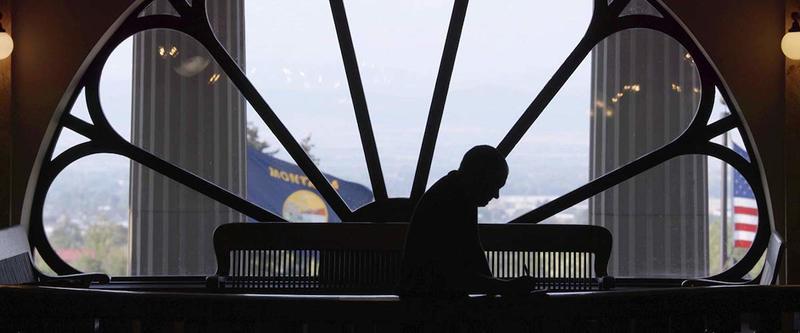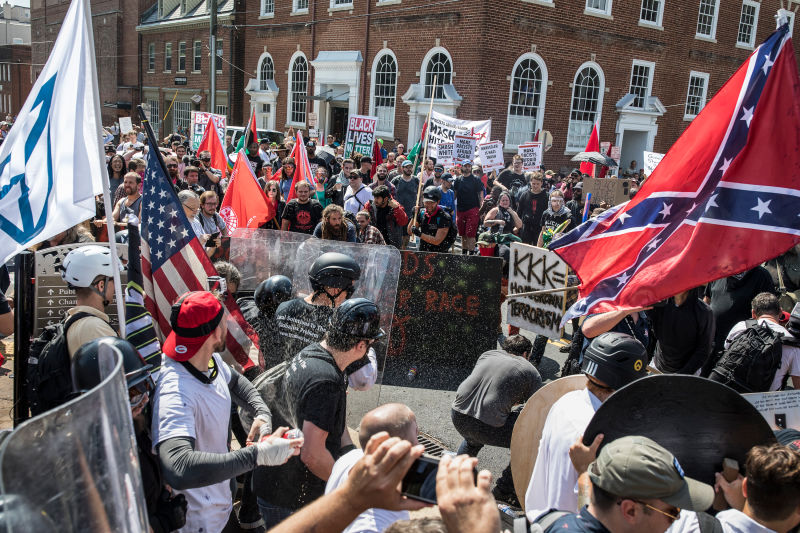Charlottesville will be on the minds of many this moth, not only because this week is the anniversary of the white nationalist Unite the Right rally, but also because Charlottesville serves as coda to Spike Lee’s latest film, “BlacKkKlansman.”
At the end of July during its TCA Summer Showcase at the Beverly Hilton, PBS also stepped into the conversation about hate groups as well as fake news and Facebook, covering the White House and Washington during Trumpian times and the truth about America.
Originally airing on August 7 (and now available to watch here), “Documenting Hate: Charlottesville” is the first in a new Frontline series. Journalist A.C. Thompson calls Charlottesville “a crime scene.” Thompson reveals there’s a new generation white supremacist street fighters filled with “happy rage” who feel protected by the authorities. One notes, Trump “opened the door.” The next episode of this Frontline series will be on Neo-Nazis.

The Frontline panel at the showcase was focused on an as yet-to-be-scheduled episode: “The Facebook Dilemma.” Facebook investor and venture capitalist Roger McNamee, who worked very closely with Zuckerberg in the early years of Facebook, said he noticed in October of 2016, that Facebook’s algorithm was “being manipulated by bad actors.” While Facebook’s goals were to “connect the world,” there were no safeguards because they convinced themselves that “literally anything” was okay. “They were willfully blind during 2016.” McNamee emphasized, “It literally never occurred to them that it was wrong.”
Washington Post journalist Dana Priest noted that the U.S. wasn’t the only country that was targeted and it wasn’t the first. What other governments did in response, “to me, that’s one of the most interesting parts” of the story. Series executive producer Raney Aronson-Rath noted, that Facebook has “all the advantages of being a media company without any of the regulatory responsibilities.”
McNamee added that while Facebook “makes editorial decisions a billion times a second” what catches our attention isn’t the thing that makes you smile. “Happiness is not viral” but fear and hate are. That gives “disproportionate power to the angriest voices.”
Because this is an on-going story, Jacoby said, “We’re kind of keeping a chunk of the film open for what’s happening right now, and also for Facebook’s participation” until the release date.

On PBS NewsHour, the separation of families is subject to an ongoing investigation and anchor and managing editor Judy Woodruff and correspondents are preparing comprehensive coverage of the midterm elections through collaborations with over 300 member stations. Executive producer Sara Just noted, “We don’t want to be the national show that just swoops in for a day or two. We want to work with the staff who know the candidates, who know the area.”
When questioned about fact-checking the president, Woodruff said, “Our view is that lying is not a term we can use lightly” because it means they “said whatever they said with the intention to mislead or misrepresent.” PBS NewsHour is more comfortable saying that it is “something that cannot be borne out by the facts” or “we say it is inaccurate.”
While Just noted, “This has been a difficult time for journalists, to be called the enemy of the people or fake news is disheartening.” What such statements have done, however, is forced journalists to “be more specific about how many sources” and it has been “pushing journalists to be more clear with their audiences.”

PBS’ “Washington Week” continues with Washington Post national political reporter, Robert Costa moderating a round table discussion from non-partisan award-winning journalists. The program will be tracking the special counsel investigation of Russian interference, asking “important questions for this democracy.” Costa said, “I don’t like to predict anything; I assume nothing. You never know who’s going to rise and fall in politics.”
With the negative attention the president has given the press, Costa feels journalists need “to show people that we are people” and that “there’s a commitment to the truth.”
For a broader focus with an international viewpoint, PBS and CNN have teamed up for the late-night show with Christiane Amanpour for conversations with global leaders and cultural influences. This is an expansion of CNN’s “Amanpour” and will include contributions from journalists Walter Isaacson, Michel Martin, Alicia Menendez and Hari Sreenivasan from Lincoln Center in New York City. Amanpour will lead the conversations from London, covering politics, business, arts, science and technology and sports. The new show expands on CNN’s “Amanpour.”
Amanpour said, “Never has the time for exploring our world and America’s place in it been so urgent.” The show will be about “really talking to the players, the top experts we can find in their fields.” She feels there is “so much chatter in the media environment” and intends “to try and cut through the chatter” but still “make it as friendly to an American audience as to an international audience.” Amanpour stated, “I believe in being truthful and not being neutral.” She added that “we exist in an unprecedented political environment; everything is hyper-partisan.”

If you missed its theatrical release, POV will air Kimberly Reed’s documentary, “Dark Money” on PBS in the fall. The film follows investigative reporter John S. Adams through the shadowy world where anonymous campaign contributions threatened Montana’s government and perhaps even the integrity of American democracy.
In his July review, Glenn Kenny wrote that the documentary “uses Montana as an object lesson in the abuses of political campaign finance laws, many of which were adversely affected (to say the least) by the Supreme Court’s 2010 ruling in the Citizen’s United v. Federal Election Committee case.”
Adams was with the Great Falls Tribune when postcards linking a politician to John Wayne Gacy were received by voters just before election day. For Adams, who lost his job during restructuring, this was “a local story with national consequences.” Of his parting with the Tribune, he said, “I do not believe that the decision was made because of any reporting that was done.” The Tribune has always been “very supportive” of Adams’ reporting, even when there were threats of lawsuits and the Tribune has been supportive of this documentary as well.
Two documentaries, “Rumble” and “Native America,” will remind viewers that most of us are immigrants and that the cultural and heritage of the indigenous people continues.
Glenn Kenny began his review of this documentary explaining the title: “‘Rumble,’ the guitar instrumental recorded by Link Wray in 1957, is to modern rock music what the monolith was to those primates in the ‘Dawn of Man’ section of ‘2001: A Space Odyssey.'” Wray helped invent the “rock” part of “rock ‘n roll” and he’s part of the Native American legacy not only in rock, but that legacy extends into other forms of American music such as the blues (i.e. Charlie Patton).

The new PBS series “Native America” goes back 15,000 years, and looks at cities that were aligned to the stars. It also will tackle the unique systems of science and spirituality, and even the social networks that connected tribes in the Americas.
Series producer, Julianna Brannum (Comanche) said that what was most surprising for her was the scale and sophistication of the cities that were created. “Some of these cities make the pyramids of Egypt look like child’s play.” Brannum noted, “This series comes at a time when many people believe that Native Americans are conquered. We are resilient and irrepressible. Our knowledge and sophistication still exists today.” She questioned, “How much do people really know about Native Americans besides playing dress up for Thanksgiving or watching cartoons or, worse, from mascots?”
The four-part series “Native America” premieres on October 23
“Washington Week” airs on Fridays
“PBS NewsHour” is ongoing, week nights
“Amanpour & Company” premieres on September 10
“Dark Money” airs on Monday, October 1
“Native America” premieres on October 23












